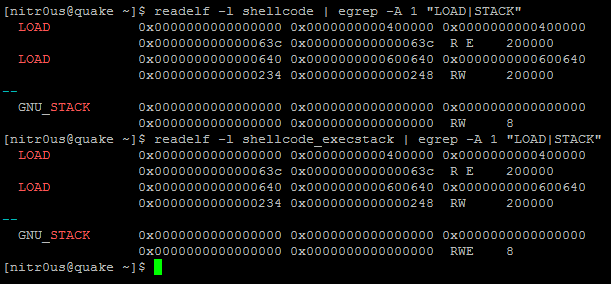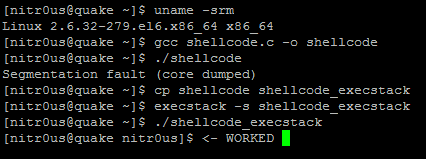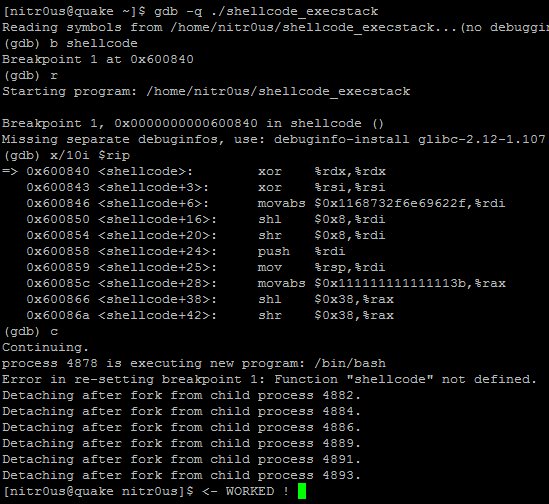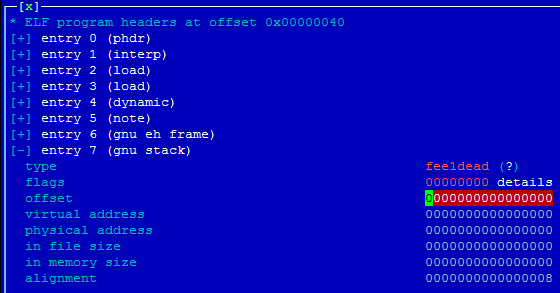#include <unistd.h>
char shellcode[] =
“x48x31xd2x48x31xf6x48xbf”
“x2fx62x69x6ex2fx73x68x11”
“x48xc1xe7x08x48xc1xefx08”
“x57x48x89xe7x48xb8x3bx11”
“x11x11x11x11x11x11x48xc1”
“xe0x38x48xc1xe8x38x0fx05”;
int main(int argc, char ** argv) {
void (*fp)();
fp = (void(*)())shellcode;
(void)(*fp)();
return 0;
}
Immediately, I thought it was wrong because of the code to be executed would be placed in the ‘shellcode’ symbol in the .data section within the ELF file, which, in turn, would be in the data memory segment, not in the stack segment at runtime. For some reason, when trying to execute it without enabling the executable stack bit, it failed, and the opposite when it was enabled:
According to the execstack’s man-page:

The first loadable segment in both binaries, with the ‘E’ flag enabled, is where the code itself resides (the .text section) and the second one is where all our data resides. It’s also possible to map which bytes from each section correspond to which memory segments (remember, at runtime, the sections are not taken into account, only the program headers) using ‘readelf -l shellcode’.
So far, everything makes sense to me, but, wait a minute, the shellcode, or any other variable declared outside main(), is not supposed to be in the stack right? Instead, it should be placed in the section where the initialized data resides (as far as I know it’s normally in .data or .rodata). Let’s see where exactly it is by showing the symbol table and the corresponding section of each symbol (if it applies):
It’s pretty clear that our shellcode will be located at the memory address 0x00600840 in runtime and that the bytes reside in the .data section. The same result for the other binary, ‘shellcode_execstack’.
By default, the data memory segment doesn’t have the PF_EXEC flag enabled in its program header, that’s why it’s not possible to jump and execute code in that segment at runtime (Segmentation Fault), but: when the stack is executable, why is it also possible to execute code in the data segment if it doesn’t have that flag enabled?
Is it a normal behavior or it’s a bug in the dynamic linker or kernel that doesn’t take into account that flag when loading ELFs? So, to take the dynamic linker out of the game, my fellow Ilja van Sprundel gave me the idea to compile with -static to create a standalone executable. A static binary doesn’t pass through the dynamic linker, instead, it’s loaded directly by the kernel (as far as I know). The same result was obtained with this one, so this result pointed directly to the kernel.
Now, for the interesting part, what is really happening in the kernel side? I went straight to load_elf_binary()in linux-2.6.32.61/fs/binfmt_elf.c and found that the program header table is parsed to find the stack segment so as to set the executable_stack variable correctly:
int executable_stack = EXSTACK_DEFAULT;
…
elf_ppnt = elf_phdata;
for (i = 0; i < loc->elf_ex.e_phnum; i++, elf_ppnt++)
if (elf_ppnt->p_type == PT_GNU_STACK) {
if (elf_ppnt->p_flags & PF_X)
executable_stack = EXSTACK_ENABLE_X;
else
executable_stack = EXSTACK_DISABLE_X;
break;
}
Keep in mind that only those three constants about executable stack are defined in the kernel (linux-2.6.32.61/include/linux/binfmts.h):
/* Stack area protections */
#define EXSTACK_DEFAULT 0 /* Whatever the arch defaults to */
#define EXSTACK_DISABLE_X 1 /* Disable executable stacks */
#define EXSTACK_ENABLE_X 2 /* Enable executable stacks */
Later on, the process’ personality is updated as follows:
/* Do this immediately, since STACK_TOP as used in setup_arg_pages may depend on the personality. */
SET_PERSONALITY(loc->elf_ex);
if (elf_read_implies_exec(loc->elf_ex, executable_stack))
current->personality |= READ_IMPLIES_EXEC;
if (!(current->personality & ADDR_NO_RANDOMIZE) && randomize_va_space)
current->flags |= PF_RANDOMIZE;
…
elf_read_implies_exec() is a macro in linux-2.6.32.61/arch/x86/include/asm/elf.h:
/*
* An executable for which elf_read_implies_exec() returns TRUE
* will have the READ_IMPLIES_EXEC personality flag set automatically.
*/
#define elf_read_implies_exec(ex, executable_stack)
(executable_stack != EXSTACK_DISABLE_X)
In our case, having an ELF binary with the PF_EXEC flag enabled in the PT_GNU_STACK program header, that macro will return TRUE since EXSTACK_ENABLE_X != EXSTACK_DISABLE_X, thus, our process’ personality will have READ_IMPLIES_EXEC flag. This constant, READ_IMPLIES_EXEC, is checked in some memory related functions such as in mmap.c, mprotect.c and nommu.c (all in linux-2.6.32.61/mm/). For instance, when creating the VMAs (Virtual Memory Areas) by the do_mmap_pgoff() function in mmap.c, it verifies the personality so it can add the PROT_EXEC (execution allowed) to the memory segments [1]:
/*
* Does the application expect PROT_READ to imply PROT_EXEC?
*
* (the exception is when the underlying filesystem is noexec
* mounted, in which case we dont add PROT_EXEC.)
*/
if ((prot & PROT_READ) && (current->personality & READ_IMPLIES_EXEC))
if (!(file && (file->f_path.mnt->mnt_flags & MNT_NOEXEC)))
prot |= PROT_EXEC;
And basically, that’s the reason of why code in the data segment can be executed when the stack is executable.
On the other hand, I had an idea: to delete the PT_GNU_STACK program header by changing its corresponding program header type to any other random value. Doing that, executable_stack would remain EXSTACK_DEFAULT when compared in elf_read_implies_exec(), which would return TRUE, right? Let’s see:
The program header type was modified from 0x6474e551 (PT_GNU_STACK) to 0xfee1dead, and note that the second LOAD (data segment, where our code to be executed is) doesn’t have the ‘E’xecutable flag enabled:
#define elf_read_implies_exec(ex, executable_stack)
(executable_stack == EXSTACK_ENABLE_X)
Anyway, perhaps that’s the normal behavior of the Linux kernel for some compatibility issues or something else, but isn’t it weird that making the stack executable or deleting the PT_GNU_STACK header all the memory segments are loaded with execution permissions even when the PF_EXEC flag is not set?
#define elf_read_implies_exec(ex, executable_stack) (executable_stack != EXSTACK_DISABLE_X)
#define INTERPRETER_NONE 0
#define INTERPRETER_ELF 2






